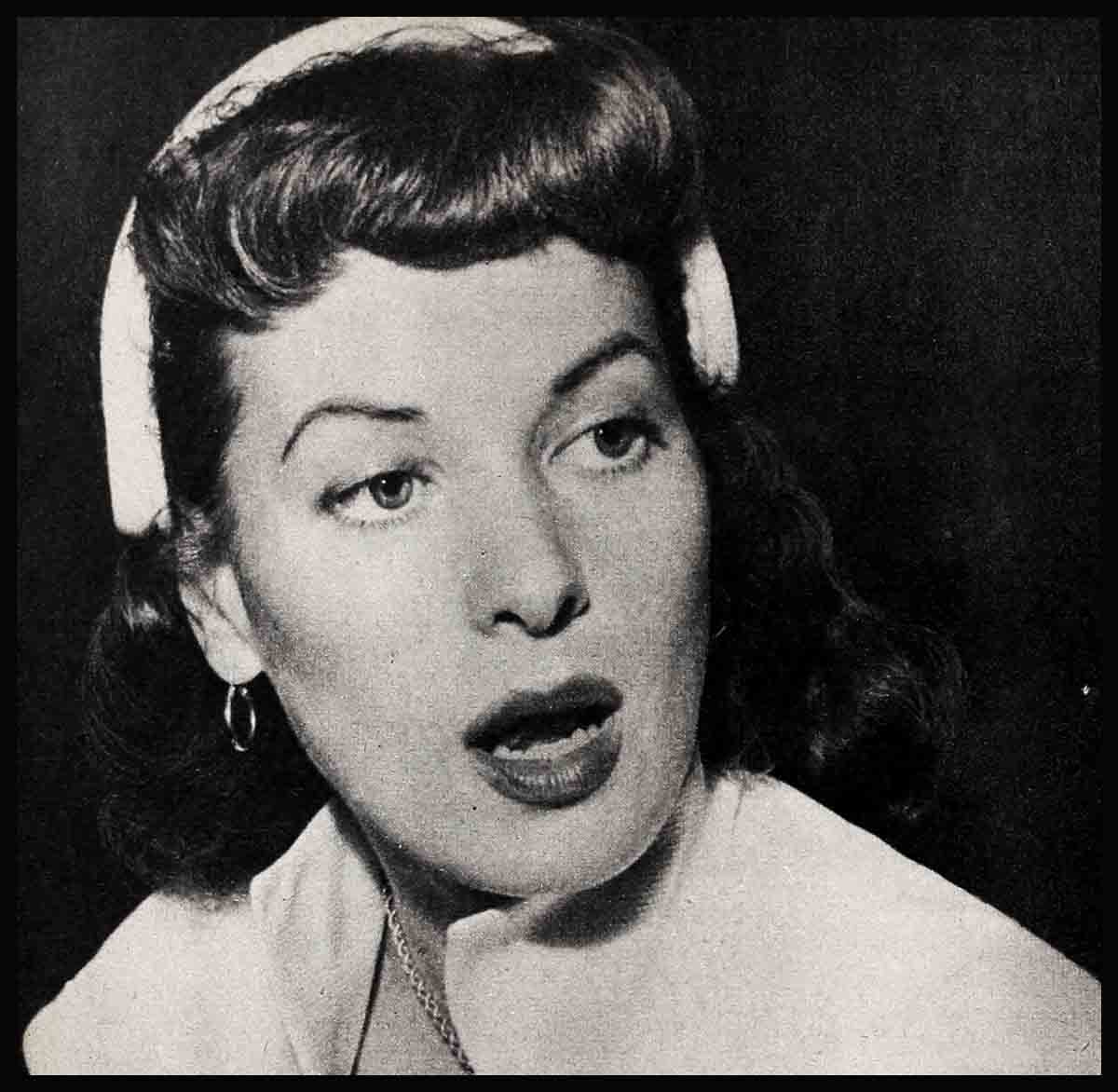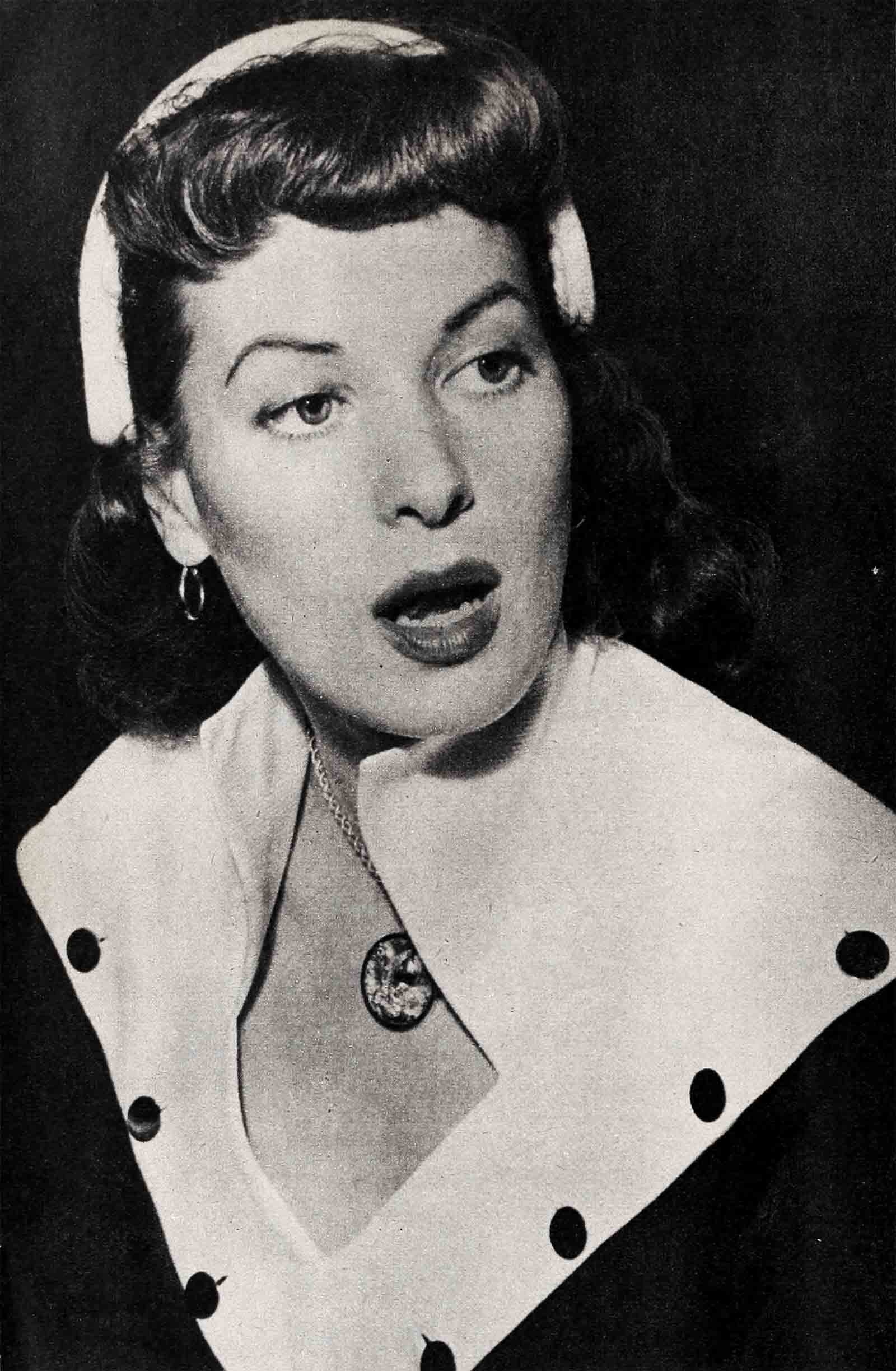
She Knows Where She’s Going!—Maureen O’Hara
“Two great trucks stopped at my door,” said Maureen O’Hara. “The door of the house which has been my home for more than ten years and is now up for sale. Out of the house came my two brothers, Charlie and Jimmy, my secretary, butler, my daughter Bronwyn’s nurse, the gardener. They were staggering under boxes, crates and barrels which they dumped, like so much rubble, onto the trucks. The trucks then drove off—with my Past. I’d given it away. And watched it go, with a lump in my throat.
“I’m a saver,” Maureen explained, “a hoarder, a human squirrel. Like Mary Kate Danaher, the fiercely possessive girl I play in ‘The Quiet Man,’ my own things are part of me. I don’t feel whole without them.
“I never, on my own initiative, threw anything away in my life. I kept the first evening dress I ever owned. I had the second evening dress I ever owned, bought fourteen years ago and used for all those years.
“I had Bronwyn’s first tooth, wrapped in a piece of Kleenex and put away for safekeeping. I had her mug and spoon, her first shoes and bonnets, all of her baby clothes.
“I had every letter Mommie and Daddy and my three sisters and my two brothers and my uncles and my aunts ever wrote me, all labeled according to date, all neatly tied with ribbons. Time and again I’ve come as close as close to throwing away a letter, a theatre program, a card that came with flowers. Then I’d think better of it and decide, I’ll throw it away next week. For me, next week never came.
“For a good ten years my family and friends have been begging me to give away, or throw away my old clothes. When they got nowhere, they carted armsful of the ‘old rags’ up to the attic until such time as they could sneak them, behind my back, out of the house. At every opportunity they’d make off with a load or two which they either gave away or sold to second-hand shops.
“Of the stuff they sold, I snuck one thing back,” Maureen relates with relish, “that is, I got it back. Just before I came to New York for the premiere of ‘The Quiet Man,’ I had a new blue outfit made and, to save me, I couldn’t find a hat I liked to go with it. Remembering, then, a big blue straw cartwheel which Id bought about seven years ago, I looked for it in vain. I found it had been sold to a local second-hand shop. Whereupon down to the second-hand shop I went, and bought back my bonnet!”
But now, for Maureen, “next week” has come.
It came. no doubt, with the ending of her ten-year marriage concerning which, deeply hurt as she is, she will not speak one word. Not now or ever. Meantime, she has shed the luggage, if not the memory of her past. And she is walking slambang into the future.
The disposal of her “bits and pieces” (well, most of them!) was the first step forward. The For Sale sign on her house, the second. And this decision she made, without prompting or prodding by family and friends, for a good, far-seeing reason.
“I’ve been looking for some time,” Maureen said, “at the motion picture stars who have lived sensibly, wisely and modestly in Hollywood and are living comfortably now. I’ve also looked at the stars who spent all their money, lived high and rich. Many of these, too many, are working as extras today.
“There is nothing in life more forlorn than the big ex-star. There is nothing more forgotten. I feel so sorry for them Ill stand there until my feet ache listening to them talk, as they all talk, using the same identical words about their ‘day.’ Just recently, on the set of ‘Against All Flags,’ which I made with Errol Flynn, one of them told me, ‘In my day, I wouldn’t have done this scene as Flynn did it. In my day, we would have . . .’ My heart begins to ache as they go on and on and on about their ‘day’ which, but they can’t face it, is their yesterday.

“ ‘Didn’t you realize,’ I feel like saying, ‘that every day must end?’
“Then all at once it came over me, ‘Do I realize it? Am I planning for security so that when my day ends, I won’t be sad, or frightened that I’m forgotten?’
“The answer, as of a year ago, was No.
“The answer, as of now, is Yes.
“I’m getting rid of my big house which requires a staff of cook, butler, laundress, nurse, secretary, gardener and cleaning woman to maintain. I’ve been away the larger part of the past two years making pictures in England, in Ireland, in Australia, taking Bronwyn with me. And there the staff has sat in that empty house.
“I am looking now for a small house that has a dining room, living room, two bedrooms, one maid’s room—that is all. A little house, our new home will be, where Bronwyn and I can turn the key and go, and with one maid enough . . .”
Maureen is not afraid of housework, she explained, nor unfamiliar with “housemaid’s knee.”
“During the war, I used to do all the housework,” she said, “the cooking, the laundry, the cleaning, did it all, made pictures, too—and it didn’t kill me, either! I had a system, a schedule: Immediately on rising at six o’clock, I’d do my bedroom and bath. I’d market on the way to the studio, prepare dinner, mostly fruit and salad, meat and cheese dishes, when I got home at night. Just before I went to bed I’d clean up the dining room and living room so they’d be in order the next day. On Sundays I did the extras, the silver, the dusting, the little things . . .”
Prompted, no doubt, by the vogue of Marilyn Monroe, there is a drive on for today’s young stars to come out of their kitchens and nurseries, quit swapping recipes, go back to swapping Romeos as did the fabulous glamour girls of old.
Some may revert to the glamour standard but Maureen will not be among them. She has been called “A pre-Raphaelite beauty with an Amazonian body.” She has, for real, alabaster skin, that cascade of red hair, amber-colored eyes, fine chiseling of nose and mouth and is as unselfconscious, as little vain as a field flower. She doesn’t even carry a mirror.
Maureen says, “When I went to Australia last year to make ‘Kangaroo’ I met a man, a technician, who had worked with me in my first picture, ‘Jamaica Inn.’ He looked at me quite startled and said “You haven’t changed in looks or in manner, since the last time I saw you more than ten years ago.’ I loved it, until he added, ‘How do you do it?’
“He had me there,” Maureen laughs. “I never go to beauty parlors. I have never had a facial in my life. Nor a masseuse except for a short time after Bronwyn was born. I do my own nails and I wash my own hair. All I do is keep healthy by trying to eat right. The American habit of sandwiches for lunch, for instance—I drop out all that bread and mayonnaise. Fruit and salad, as I have said, and plenty of meat.”
Lack of temperament that explodes into the public prints—the early Swanson, for instance; the very current Shelley Winters—will also deter O’Hara from going the glamour gait.
“I’ve never walked off a set; I’ve never had a temperamental fit in my life,” Maureen says. “I think I co-operate too much.
“But I have a certain laziness by nature so that when everyone at the studio screams and yells and I, too, have a right to be mad, a little voice inside of me says, ‘Oh, nuts with it!’ ”
Furthermore—and this is purely fatal to the “femme fatale”—Maureen is a home-lover, with family ties wound round and round her heart. She says, “You hear so many girls say, I couldn’t live with my mother and father again!” I am not one of them. I could live in contentment, as I did when a child, with my whole family again.
“ ‘The Quiet Man’ was a joy to me because it was a family picture. We made it in Ireland, near enough my old home for me to be often with Mommie and Daddy. Then, too, my brothers Charles and James were in the picture with me. John Ford, who directed the picture, had his children with him in Ireland, and Barry Fitzgerald was in a nest of kinfolk and old cronies. It made things cozy.”
Now that Charlie and Jimmie are in Hollywood, with bright film futures predicted for them, Maureen is trying to persuade them to make their home with a her. “For this, I would add two rooms,” she smiles, “to the little house I hope to buy. The uncles coming in and out, we would be a big Irish family again.
“Bronwyn and I have talked about adopting a baby,” Maureen says. “I’ve told her that if we do, we will go together to choose ‘our’ baby.
“Meantime, the picture work is going well. ‘The Quiet Man’ has had what they call ‘rave’ reviews and I’m just curious, now, to see what’s going to happen—will it really make any difference, a great picture? Someone asked me the other day if I had a double in any of the rugged, fisticuff scenes I played with John Wayne in ‘The Quiet Man.’ I did not. And in the first love scene, I broke the bones of my wrist when I slapped Wayne’s face.
“The Irish, although they sink into the depths very easily are, basically, a happy people. Very few Irish people go to psychiatrists because, whatever happens to them, they accept it. If something bearable comes, they accept it as the will of God. If something marvellous, they accept it as a gift of God.
“Whatever happens, I will do likewise. Being human, I hope that what happens will be a gift of God.”
THE END
—BY GLADYS HALL
It is a quote. PHOTOPLAY MAGAZINE DECEMBER 1952




